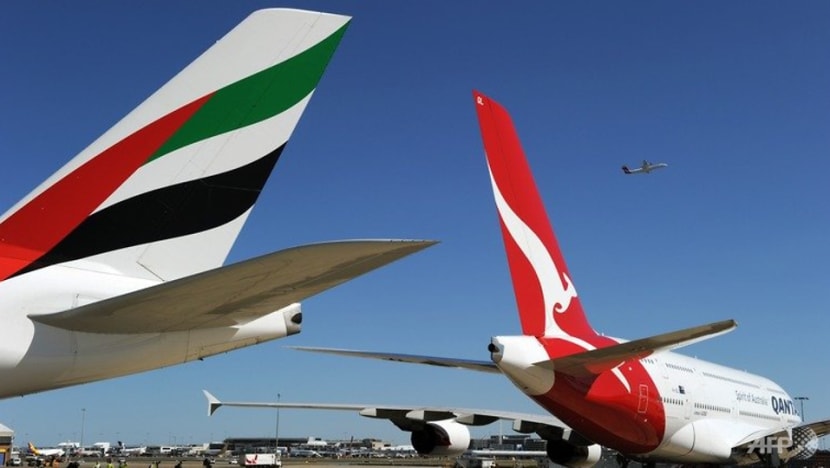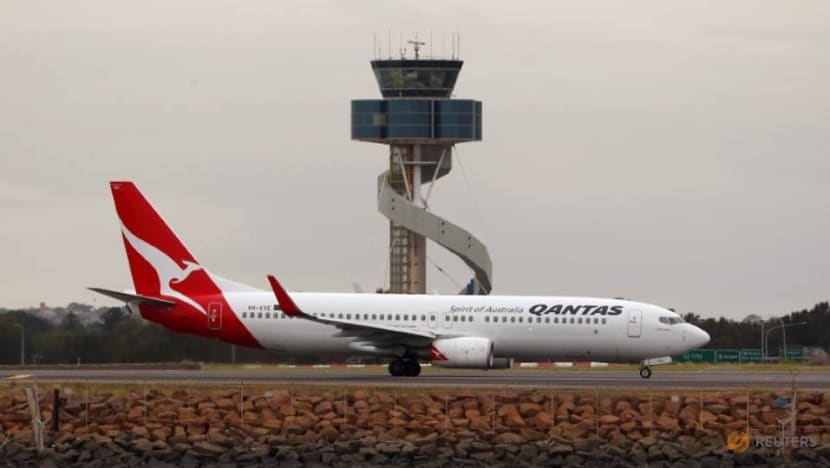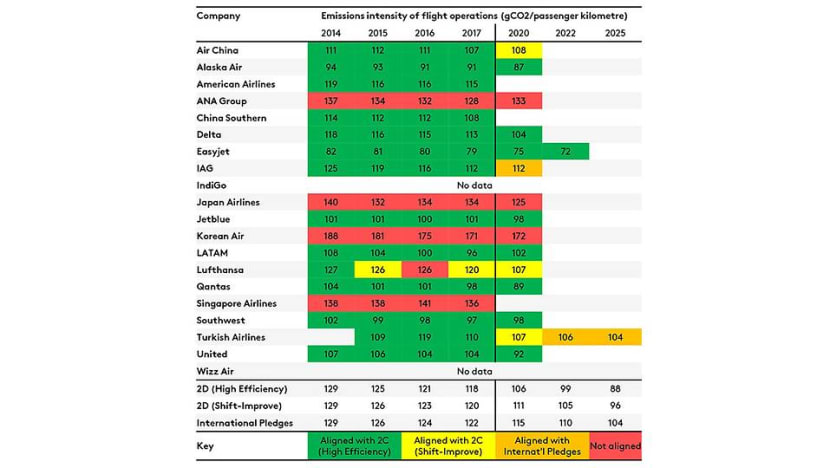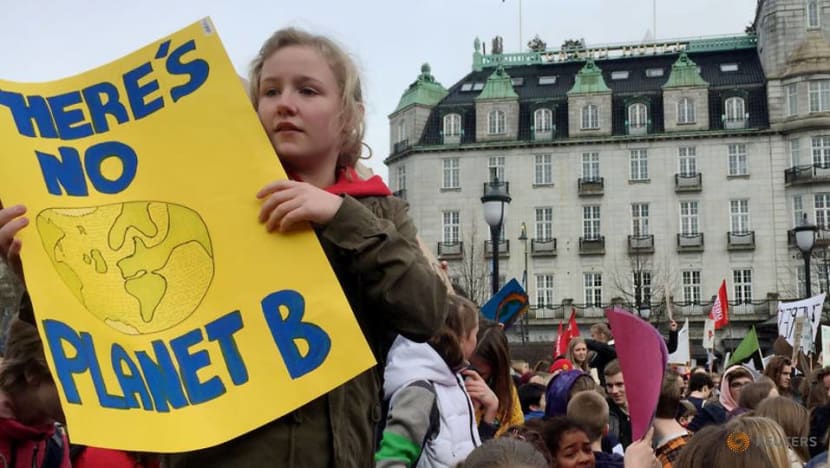Less waste, greener skies: Reducing the environmental impact of flying

Planes from Qantas and Emirates. (File photo: AFP/Greg Wood)
SINGAPORE: If you’re a regular flier with Singapore Airlines (SIA), you may have noticed that salt and pepper packets are no longer included in the meal trays served in economy class.
In fact, the airline removed salt, pepper and sugar packets in November 2018.
This is one of the many initiatives taken by the carrier to contribute to “greener skies” by reducing food wastage on board and cut back on the use of in-flight items, a company spokesman told CNA in response to queries.
“SIA has embarked on many new initiatives in the last financial year to continue offering our customers the best travel experience while operating more sustainably,” the spokesman said.
The carrier is also taking steps to reduce single-use plastics and replace them with more sustainable materials.

Those travelling in business class are still offered the condiments, as these are served in shakers instead of disposable packets. That is not to say passengers in economy class don’t have to miss out on that extra kick of flavour - salt and pepper are still available, but passengers need to ask for the packets.
This is not the only environmental initiative that SIA has brought in.
“We aim to become entirely plastic straw-free this financial year,” the spokesman said. “During the last financial year, we began the process of removing plastic straws onboard, and the remaining, children’s straws, are to be substituted with environmentally friendly paper straws by September 2019.”
Becoming more sustainable is not an uncommon move in the aviation industry.

For a start, Qantas Airways operated what it said was the “world's first zero waste flight” on May 8 from Sydney to Adelaide, with all in-flight products reused or recycled, or disposed of through composting.
AirAsia claims to be the only airline in Malaysia to perform onboard cabin recycling since 2015, where recyclable items are handed over to certified recycling partners after every flight.
"Everybody is cognisant of the benefit of aviation but we also have to be mindful of all the risks we create, and that's why airlines all over the world have come very strong in promoting sustainability efforts," said AirAsia's group head of global affairs and sustainability Shasha Ridzam.
SAVING THE EARTH OR JUST A PR STUNT?
But given that aviation is responsible for two per cent of global man-made carbon emissions, is there such a thing as a “green flight”?
While experts agree that these initiatives are a step in the right direction, they can be a distraction from the bigger picture.
“It can be hard to know from the outside whether these efforts are in done earnest or if the companies are greenwashing,” said Assistant Professor Sonny Ben Rosenthal at the Wee Kim Wee School of Communication and Information.
Greenwashing is a term used to describe businesses that implement strategies designed to create a false impression about their environmental credentials.
“Waste minimisation is a good one to choose from a PR standpoint because it is relatively easy to implement and show to the public. It’s like the anti-straw movement. When consumers bring their own straws to drink from plastic cups with plastic lids, they’ve still wasted a lot of plastic.”
But with the International Air Transport Association (IATA) projecting air travel to double in the next 20 years, regional aviation analyst Mohshin Aziz of Maybank Kim Eng said that “there simply is no better alternative for the moment".
“Would anyone want to take a train from Europe to Asia as it is purported to be the most environmentally least impactful? I don’t think so,” he said.
“The only real thing for airlines to do really is to buy the latest aircraft model there is, because it has the best fuel efficiency and lowest carbon footprint. But that is not always possible because of the long aircraft lifecycle.”

A report published in March from the London School of Economics (LSE) suggests that twenty of the world’s largest airlines do not have strategies in place to help meet the Paris Agreement goal of limiting global warming to below 2 degree Celsius in the long term.
None of the twenty airlines has a target that clearly specifies how it will reduce its own flight emissions after 2025.
The report also says that only the UK's EasyJet is meeting those aviation targets so far, with companies named as having the weakest plans to cut emissions including Air China, China Southern, Korean Air, Singapore Airlines and Turkish Airlines.
However, there are some limitations to the LSE research, as pointed out by Korean Airlines in a BBC article. It doesn’t take into account that some airlines carry much more baggage and freight than others.
In response to queries on its efforts to cut down on carbon emissions, SIA said that the average age of its fleet is “just over six years”, which allows them to benefit from new, fuel-efficient technology.
“In addition, SIA has since 2011 been an active member of Sustainable Aviation Fuel Users Group, which was established to accelerate the development and commercialisation of sustainable aviation fuels,” the company spokesman told CNA.
“SIA sees sustainable aviation fuel as a long-term measure to support the aviation industry’s carbon-neutral growth goal beyond 2020.”
READ: Air travel’s huge carbon footprint and its climate-friendlier alternatives
THE FLIGHT SHAMING MOVEMENT
Meanwhile, an anti-flying movement is catching on in Europe.
Fueled by activists in Sweden, “flygskam” which translates to “flight shame” is the name of the movement which encourages people to stop taking flights to lower carbon emissions.

On Wednesday (Aug 29), 16-year-old activist Greta Thunberg arrived in Manhattan after a two-week journey on a zero-emissions sailboat to take part in a United Nations summit.
READ: 'War on nature must end,' says activist Greta Thunberg in New York
The two-week journey from Britain to New York would have taken just eight hours by flight - but she refuses to fly because of the carbon emissions generated by the aviation industry.
SHOULD AIRLINES BE CONCERNED?
Although anti-flying campaigns have yet to generate mass interest, environmental activist and founder of Green Drinks Singapore Oliva Choong said that this is something that airlines should keep an eye on: “While this group may be small right now, there is a need to cater to concerns towards the climate because it is a pressing issue that their existing customers feel or may do so with greater environmental awareness.”
“SIA's biofuel flights are a step in a greener direction although there is still a large amount of carbon emissions generated through flying,” she added.
SIA launched its first biofuel flight in May 2017. The flights are powered by a combination of hydro-processed esters and fatty acids, a sustainable biofuel produced from used cooking oils, and conventional jet fuel.
“Aviation companies should adopt greener practices because it's the right thing to do, and in some cases, it will save them money in the long run," said Ms Choong.

Echoing this, Flightglobal's Asia managing editor Greg Waldron said: “Airlines have always been talking about and looking at ways of cutting fuel and thereby cutting emissions because fuel is a significantly big cost.
“They have a very real economic incentive to reduce the amount of fuel that they consume simply because that's where their profitability comes in.”
He pointed out that governments and regulators can also have a hand in this.
“When there's major (air) traffic and planes have to circle over the airport for twenty to thirty minutes because of congestion, that's wasting a lot of fuel that doesn't need to be wasted.”
Ultimately, while “flight-shaming” remains confined to Europe, air travel may come increasingly under the spotlight regarding its negative environmental impact.
“If it’s a movement that was to gain momentum, I think airlines will be very concerned about it,” said Mr Waldron.
“They have to recognise that there's certainly a sentiment out there and that's why you're seeing this.”
















